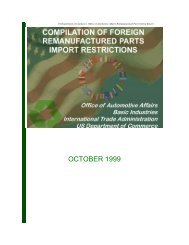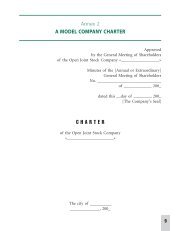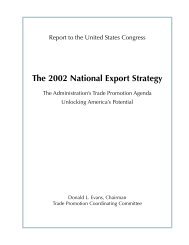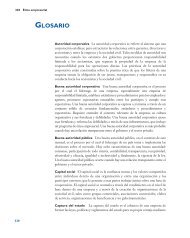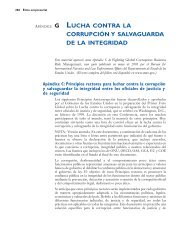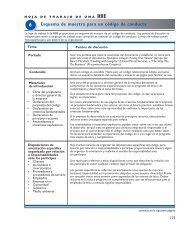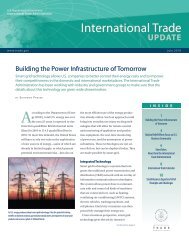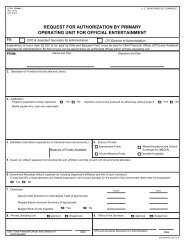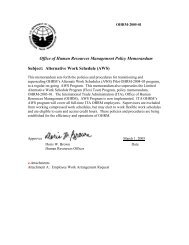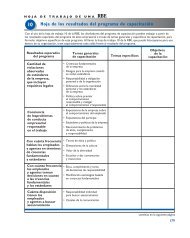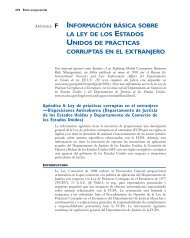Global Steel Trade; Structural Problems and Future Solutions
Global Steel Trade; Structural Problems and Future Solutions
Global Steel Trade; Structural Problems and Future Solutions
Create successful ePaper yourself
Turn your PDF publications into a flip-book with our unique Google optimized e-Paper software.
3.3 Korea<br />
1. Organization for Economic Cooperation <strong>and</strong> Development, Economic Survey of Korea, 1999 (Paris, July 1999),<br />
10. [Hereinafter OECD-Korea] “Prior to the crisis, the financial system was characterized by pervasive government<br />
intervention <strong>and</strong> discretionary enforcement of prudential rules.” A report from the International Monetary Fund<br />
echoes this sentiment: “The government’s history of intervening in the market, bailing out corporations, directing<br />
lending <strong>and</strong> appointing bank managers had undermined banks’ ability to appraise credit <strong>and</strong> market risk … <strong>and</strong> led to<br />
excessive corporate risk-taking.” International Monetary Fund, IMF Staff Country Report No. 00/11: Republic of<br />
Korea: Economic <strong>and</strong> Policy Developments (Washington, D.C., February 2000), 94 [Hereinafter IMF–Korea]. See<br />
also Organization for Economic Cooperation <strong>and</strong> Development, Conference on Corporate Governance in Asia: A<br />
Comparative Perspective, Corporate Governance in Korea (Seoul, March 3–5, 1999), 38–44. “The distorted<br />
incentive structure….was largely affected by the policy environment, characterized by undue state influence in credit<br />
allocations as well as lax financial supervision <strong>and</strong> regulatory framework.” (38). “In Korea, unhealthy links between<br />
government <strong>and</strong> banks were a legacy of government-led economic development. The state influence over the<br />
banking secetor has waned along with the progress in financial liberalization.… [but] it has remained substantial until<br />
recently.” (38). “The Korean government had to provide an implicit guarantee on bank lending as it played a major<br />
role in credit allocation. Also, given the tight linkage between the banking <strong>and</strong> corporate sectors, corporate failures<br />
had an immediate impact on the soundness <strong>and</strong> viability of banks. For these reasons, the government undertook<br />
major corporate bailout exercises on numerous occasions.” (44).<br />
2. Economic Report of the President, February 1999, 230. Available from http://ww3.access.gpo.gov/; Internet.<br />
3. See discussion on Korean financial sector restructuring in Chapter 5.<br />
4. These were Hanbo Iron & <strong>Steel</strong> Co. Ltd., Sammi <strong>Steel</strong> Co. Ltd., Kia <strong>Steel</strong> Co. Ltd, Hwanyung <strong>Steel</strong>, <strong>and</strong> Shinho<br />
<strong>Steel</strong>.<br />
5. See supra, note 1.<br />
6. “Hanbo <strong>Steel</strong> to Sell Its Assets for $480 Million,” Wall Street Journal, March 8, 2000. Hanbo’s debts were over<br />
8,000 billion won at the end of 1998. “Nabors wins Hanbo <strong>Steel</strong>,” Metal Bulletin, March 8, 2000. Please note that<br />
dates of Metal Bulletin articles cited may not correspond to dates of publication in printed versions of Metal<br />
Bulletin.<br />
7. A Profile of the <strong>Steel</strong> Industry in East Asia (London: Metal Bulletin plc, 1999) 81. [Hereinafter MBR, Profile].<br />
8. Barry D. Solarz, American Iron <strong>and</strong> <strong>Steel</strong> Institute, Perspectives on <strong>Steel</strong> Markets <strong>and</strong> <strong>Trade</strong>: Report on the<br />
NAFTA Region, (Washington D.C.) Testimony before the Organization for Economic Cooperation <strong>and</strong> Development<br />
(OECD) <strong>Steel</strong> Committee Workshop on <strong>Steel</strong> <strong>Trade</strong> Issues (Paris, May 27, 1998). Testimony available from http://<br />
www.steel.org/policy/trade/st_980527.htm; Internet.<br />
9. Bryan Berry, “The Nucors of Asia: Hanbo <strong>and</strong> Tokyo <strong>Steel</strong>,” Iron Age New <strong>Steel</strong>, Vol. 12, No. 1, January 1996,<br />
60–69.<br />
10. Peter Underwood, Fry Consultants Incorporated, Korea’s Current Economic Crisis, Web site available from<br />
http://www.fryconsultants.com; Internet, accessed May 18, 2000.<br />
11. “Hanbo <strong>Steel</strong> Gets Bailout,” American Metal Market, January 30, 1997, available from http://www.amm.com;<br />
Internet.<br />
12. Ihlwan Moon, “Korea’s Kim: War on Two Fronts,” Business Week, March 2, 1998.<br />
While other companies are paying interest rates of some 30%, these failed companies<br />
[Hanbo, Sammi, <strong>and</strong> Kia] are paying half that rate or lower as interest, says Min Sang<br />
Kee, an economics professor at Seoul National University.<br />
Despite a string of widely publicized failures, no big company has shut down any major<br />
factory. Giant Hanbo Iron & <strong>Steel</strong> Co. entered court receivership a year ago, but it is<br />
still churning out steel. So is Sammi <strong>Steel</strong> Co., which failed in March, 1997… Kim wants<br />
the banks to stop lending to big companies at preferential rates. But in just the past six<br />
weeks, banks have provided nearly $1 billion in “emergency relief loans” to sickly<br />
chaebol. (54)<br />
13. Organization for Economic Cooperation <strong>and</strong> Development, Asia <strong>and</strong> the <strong>Global</strong> Crisis – The Industrial<br />
Dimension (Paris, 1999).<br />
By frequently intervening to assist business groups on the verge of bankruptcy, the<br />
government stifled the operation of a well-functioning exit market. The too big-to-fail<br />
policy of the government had the effect of dramatically reducing the exposure of the<br />
210 <strong>Global</strong> <strong>Steel</strong> <strong>Trade</strong>: <strong>Structural</strong> <strong>Problems</strong> <strong>and</strong> <strong>Future</strong> <strong>Solutions</strong>



